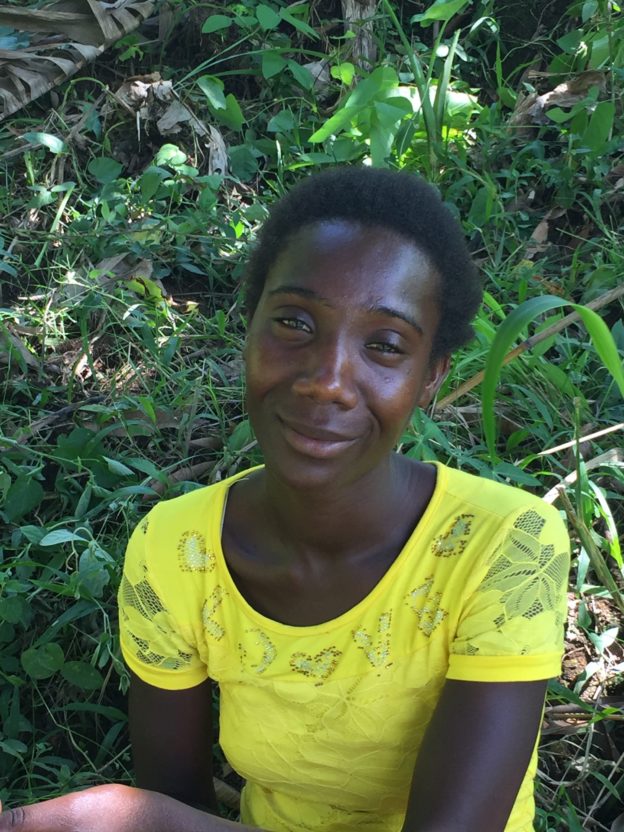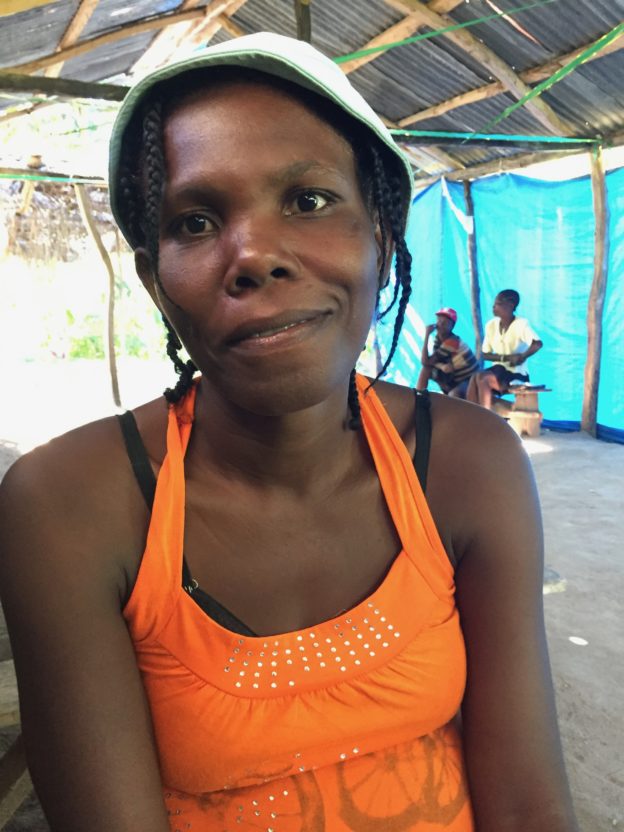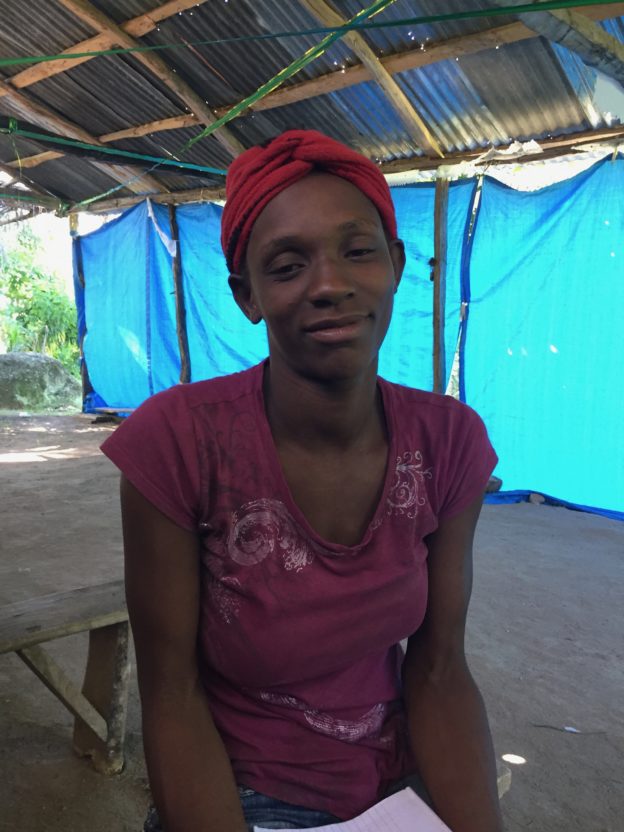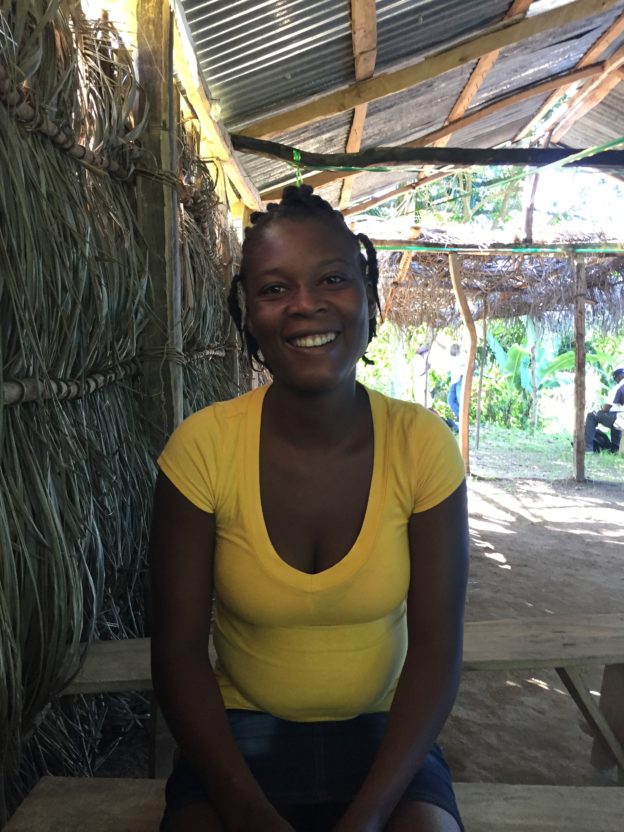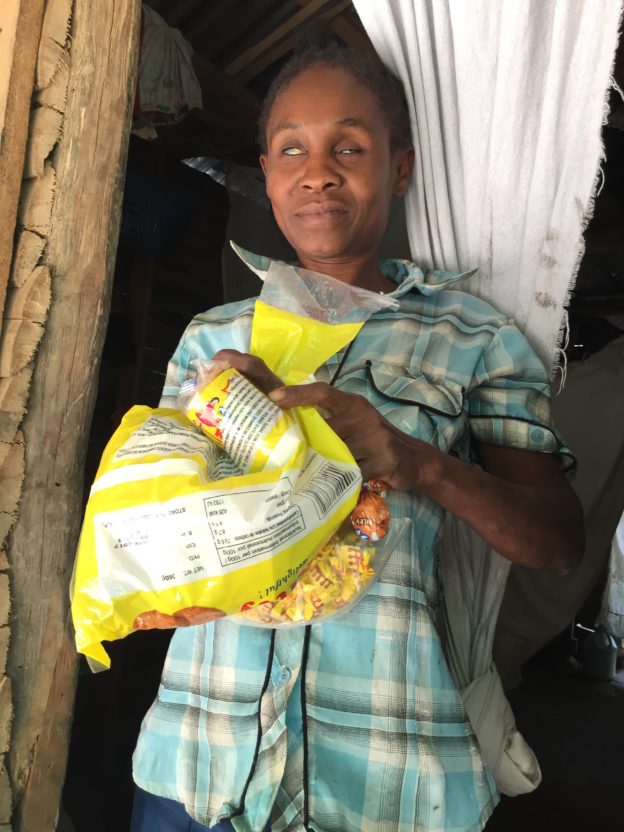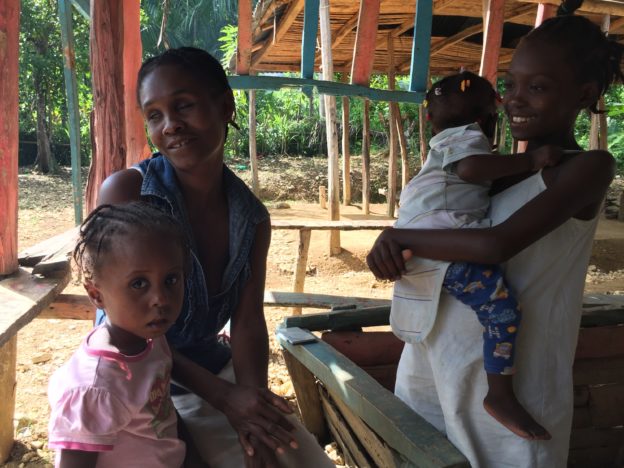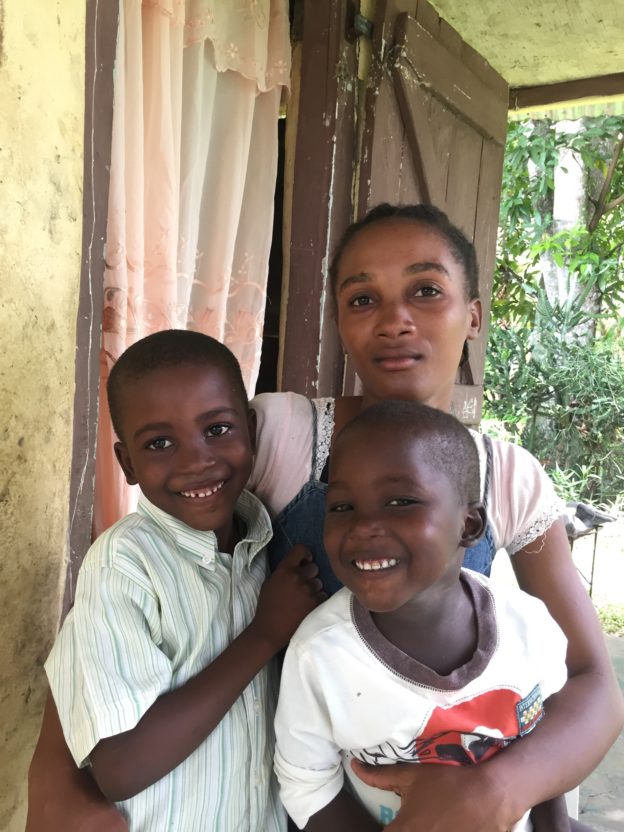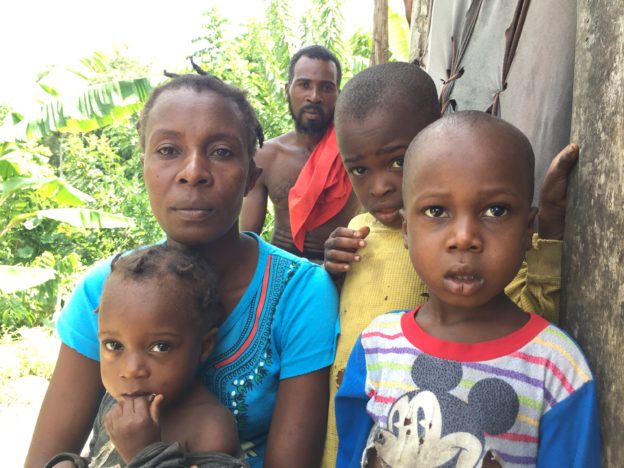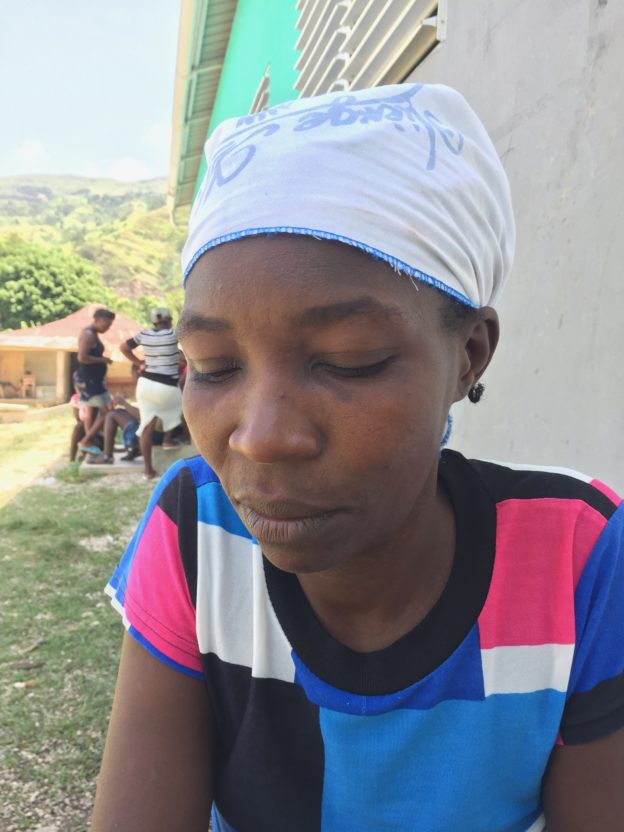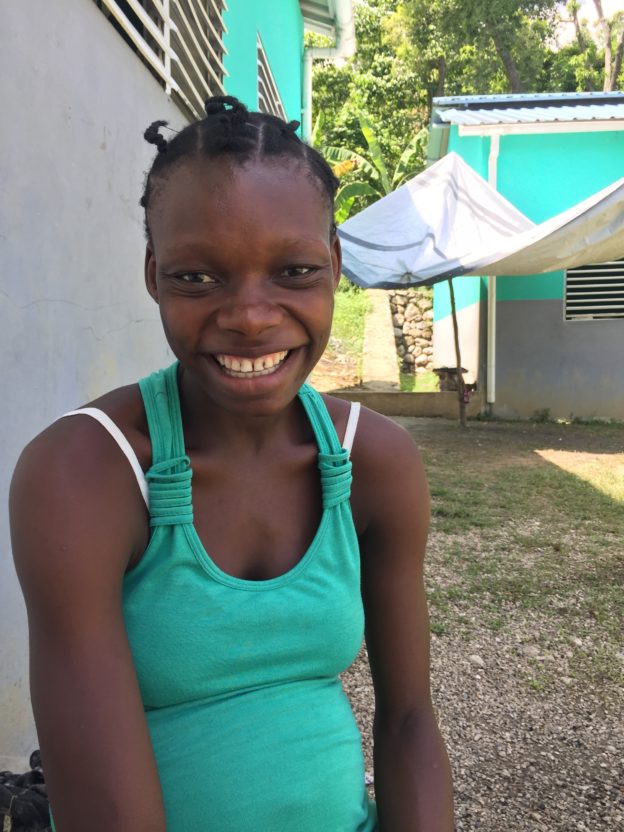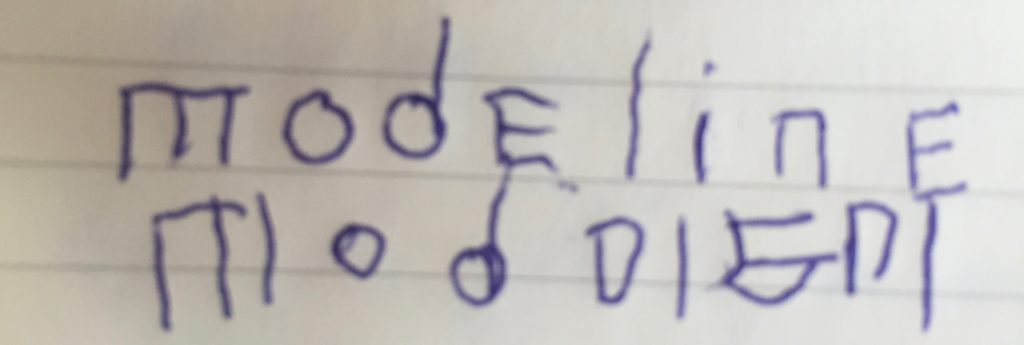Bakè sits along an important, though unpaved secondary road that branches off the main one from Mirebalais to the Dominican border. The road through Bakè leads to Mache Kana, one of the important rural markets in the lower Central Plateau. Twice each week Mache Kana fills with merchants from Port au Prince, who come to buy produce by the sack. They take truckloads back for sale in Port au Prince. Bakè is at the entrance of the road, well before the market. The road through it is wide enough for the large produce trucks and for the dump trucks that come to collect rocks for construction at the Gaskoy River, which the road crosses.
The CLM team is now working around and beyond the market, but until April 2016, it was working in Bakè. The members there were part of a cohort of 300 families. Most lived in various neighborhoods of Eastern Mirebalais, along the main road.
Angeline Michel was a member of the cohort. When the CLM team met her in late 2014, she was living with a toddler and an infant in a small room in another woman’s home. The woman was a member of her church. As Angeline says, “Not even a relative.” But when she saw that Angeline had nowhere to go with her kids, she offered her a small space to sleep in. The children’s father lived nearby, but he didn’t really help support his kids. On the contrary, he was inclined to waste anything either he or Angeline managed to earn.
Unlike almost any woman who has entered the CLM program, Angeline had a job at the time. She worked as a teacher’s assistant in a preschool. The biggest part of the job was to manage children who either wet or soiled themselves. It paid 1500 gourds, or about $25, per month. It wasn’t – it couldn’t be – her main source of income because she rarely was paid. Principals of rural schools can find it challenging to collect school fees. Parents just can’t pay. The schools depend on that revenue, however, so it is hard for principals to pay teachers and other staff, too. Angeline’s salary was more a plan than a reality.
Instead of depending on her job, she depended on small commerce. “I would go to the market after school twice-a-week and buy laundry soap on credit. Then I’d carry it around the market until I sold it all. I’d pay for the soap at the end of the day, and I’d go home with whatever my profit was.”
When Angeline joined the CLM program, she chose goat-rearing and a pig-rearing as her two activities. Taking care of the goats didn’t go very well. Hers got sick and died. But she had better luck with pigs. She chose to raise a female, and it grew quickly. It only had two piglets in its first litter, but they were healthy.
She also saved up 1000 gourds and invested it in small commerce. She would buy fruit in and around Mache Kana, and then bring it to downtown Mirebalais, where she could sell it for much more. It was hard work, because the prices she was able to ask were highest if she was willing to walk up and down the more residential streets, carrying the fruit on her head, selling it piece by piece to customers at their homes. And she couldn’t invest much more than 1000 gourds because she could only carry so much merchandise around on her head. Nevertheless, it was a business model that worked. She would leave the school where she worked every day as quickly as she could, and then spend the afternoon selling her goods.
She struggled with her husband’s selfishness. When he sold off her two piglets, she quickly fattened up the sow, and sold it to buy a cow. Rather than keeping the cow herself, she gave it to a member of her family to look after. The man she chose for the job will have a right to every other calf her cow bears as his fee, but it means the cow is in safe hands, beyond her husband’s reach.
Angeline’s work at the school went well. The school’s owner appreciated her effort. “He saw that I tried to learn everything the teacher was doing.” Eventually, he promoted her to preschool teacher, with a raise from 1500 gourds per month to 2500. She took care of her children with the money from her business, and used the payroll – whenever the school director got around to paying it – to invest. Soon she had three small pigs. Her husband eventually sold them to buy the papers he would need to work legally in the Dominican Republic. Once he left, however, he began, at least occasionally, to send money to help her with their kids.
The money he sends became important because she had to give up her small commerce. She originally could go to Mirebalais in the afternoons because she had a neighbor she thought she could leave her children with. But one time while she was away, her baby wandered into the street and was hit by a passing motorcycle. Fortunately, he suffered only a broken leg, but she decided that she couldn’t trust people to keep an eye on the kids. So, now when she comes home from school every day, she stays with her boys.
The three of them live off food she buys on credit from a local merchant. She pays whenever she receives her salary or the boys’ father sends money from the D.R. “I haven’t made progress since I graduated from CLM,” she says, “but my boys and I live comfortably.” And she has a clear plan. “I’m keeping an eye on the cow. It hasn’t gotten pregnant yet, and I may have to sell it and buy another. I’m also saving whatever I can to buy a pig. I’ve done well with them.”
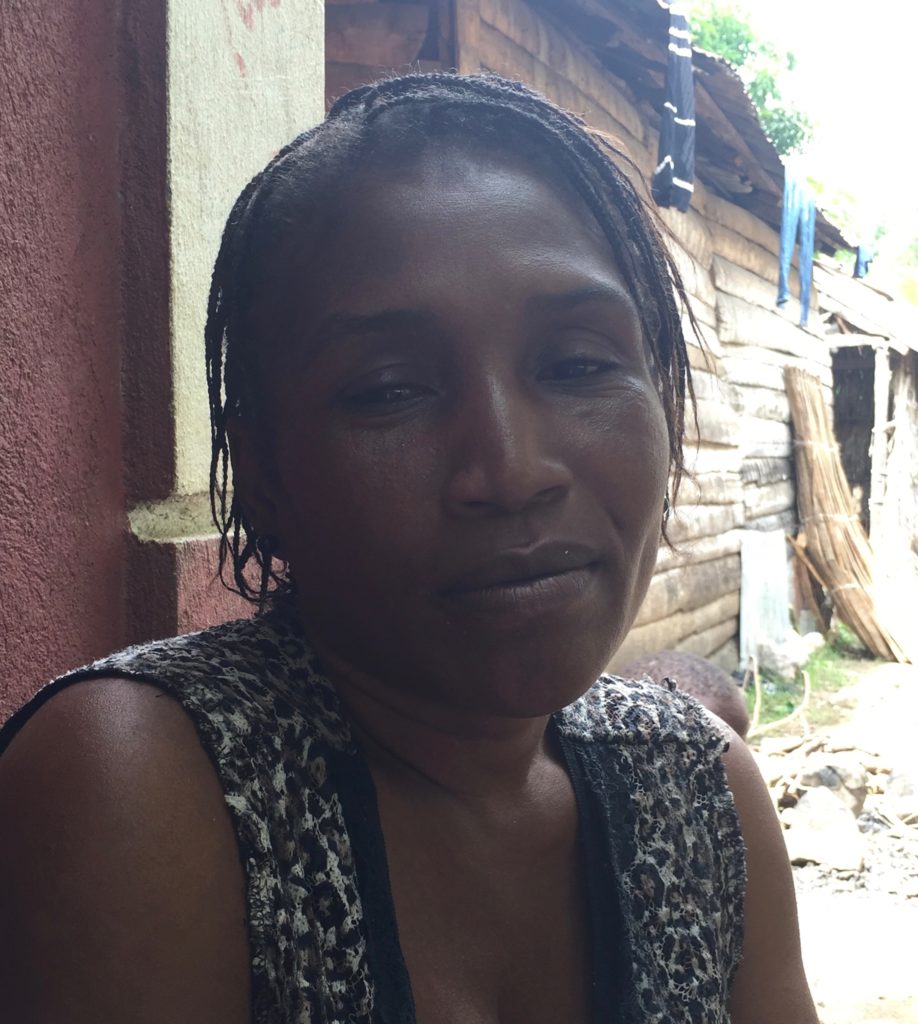
Nannan Cinéas hasn’t done as well as Angeline. She joined the CLM program in the same cohort of 300 families. A mother of seven children, she lives with five of them. Two others live with the father, from whom she is separated.
Before she was a CLM member, she was a successful business woman. She had over 5000 gourds in her small commerce. At the time, that was more than $100. But sending her children to school was the most important thing to her, and paying school fees for the four school-age kids who were with her gradually ate away her capital. When she joined the program in 2014, her business was no more. She depended on gifts of food or cash from neighbors or family – a cup of cornmeal or rice, 25 or 50 gourds – just to get by.
Like Angeline, she chose goats and a pig as the assets for us to give her, but none of those that we gave her survived. She worked hard and saved her money, and was eventually able to replace them. By the time she graduated, she had three goats and a pig. She also found a job as a cook in the same school that employed Angeline.
And like Angeline she used support that CLM gives all of its members to build a house. She finally had a place of her own to raise her children.
Or so she thought. The house and the accompanying latrine were hers, but she built them on land that she rented with her case manager’s help. Shortly after graduation, however, her landlord told her he wanted his land back. He wasn’t willing to have her on it anymore.
So, she sold her house for 6000 gourds and rented a small room for 2000 gourds per year. By then, her second set of livestock had died. Without livestock that she could sell to send the kinds to school, most of the money from the sale of her house went to pay the fees. What’s worse, she lost her job because her last pregnancy left her unable to work for several months before and after the birth of her child.
With no job, no livestock, and no commerce, Nannan feels as though she is back to zero. Once again, she depends on gifts from family members and friends. And with the due date for her rent approaching, she has no idea how she will raise enough money to keep her room, nor has she figured out where else she could go. She has no plan.
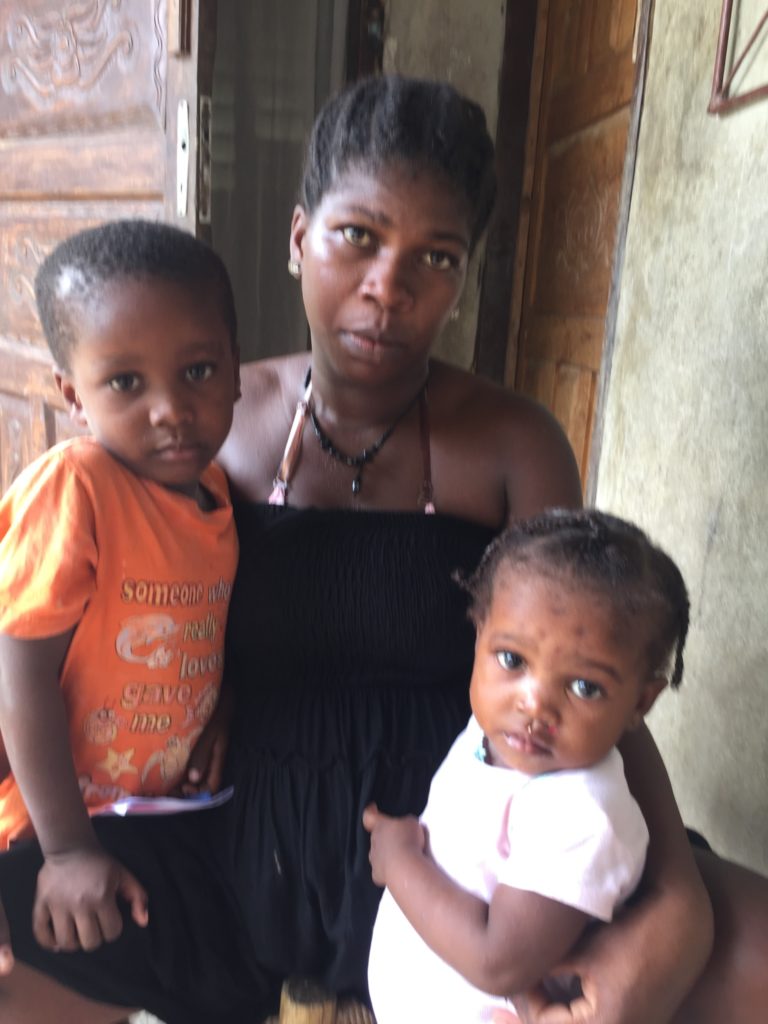
Béatrice Marcellus finds herself in similar straights. She’s a single mother with two young children and a third on the way.
She had better luck with her livestock than the other two women. When she graduated from the program, she had three goats, a growing pig, and some turkeys as well. Because she has fewer children than Nannan, she pays less to the local school, too.
But like Nannan, she built her CLM home on rented land, and the land’s owner decided to force her off it. “He didn’t just ask me to leave. He went out of his way to humiliate me. He would tie animals up in the front yard, and litter my yard with straw.”
She sold her house for 5000 gourds, and found a room to rent. She sold her pig and her turkey because she no longer had any place she could keep them, and her goats died because she didn’t keep them well fed. The place she found to rent is expensive, though. It costs 7500 gourds per year. She had the cash when she needed it because of the sale of her house and her pig, but there is very little chance that she’ll be able to raise as much money once again when the rent comes due.
We on the CLM team can and must learn a lot from the experience of the women from Bakè. The staff who worked with them closely seem to have done a poor job. On one hand, though it is not unusual for some members to lose some of their livestock, the losses that these three women suffered are unusually high. It seems likely that either the animals were poorly chosen in the first place, that the women were not taking good care of them, or that they were living in situations that made success with livestock unlikely. Good case management might have corrected any of these issues. And our team seems to have failed to work with the important people around the women: Angeline’s husband and the other women’s landlords. But part of our failure here is probably tied to a general fact about our program, one that needs to change.
We work hard with our members to help them learn to plan for the future. Research in behavioral economics and our own experience both tell us that people living in ultra-poverty, people poor enough to suffer from hunger a lot of the time, tend to be so focused on their daily struggle that they have no space in their thinking for considerations of the future. We believe that helping them get themselves to the point at which they can establish a clear plan is a key part of enabling them to make progress that can endure. They need to have a sensible objective, a practical strategy for attaining that objectives, and a realistic timeline for accomplishing each step in their plan.
But when we talk with our staff about future planning, we focus heavily on our members’ investments. How will they continue to earn money, and how will they be able to continue their growth by investing a part of what they earn? We probably don’t focus enough on the other aspects of their lives that require planning: establishing a secure housing situation or managing a prodigal partner. Until we teach case managers and CLM members as well to look at future planning as it relates to all the aspects of their lives, the progress that some of our members make will remain fragile.
All the CLM team’s experience over the last ten years suggests that our poor results with Béatrice and Nannan are very much the exception, not the rule. Our research partner, the Institute of Development Studies, in Sussex, England, is currently helping us study the program’s long-term impacts as a way to confirm that this is so. But even if it turns out the Nannan and Béatrice are a tiny minority, it is critical that we correct whatever went wrong for them.
